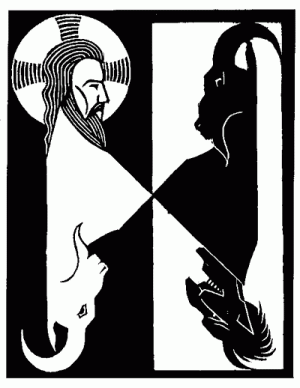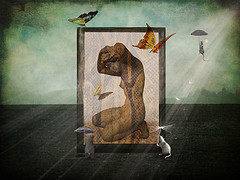Fear, Contagion, and Scapegoating – Oh my
The figure of the “evil other” is a pre-ethical fixation for the religiously-minded paranoid.  Everything that one most dislikes or finds threatening can be projected upon others and (usually symbolically) murdered in the age-old tradition of the scapegoat. Such projection engenders – and feeds upon – symbolic (and real) violence.
Everything that one most dislikes or finds threatening can be projected upon others and (usually symbolically) murdered in the age-old tradition of the scapegoat. Such projection engenders – and feeds upon – symbolic (and real) violence.
Predatory on the people who cannot bear to examine themselves, leaders of such movements play on fears of contagion, defilement and stain from without – from the evil others – and project a colonization and epidemic spread of the embodiment of such fears. This defensive projection is unstable because hidden in it is more than a grain of attraction and desire for what they have rejected.
 The sin bucket is never full because it never matures into a meaningful guilt. The bucket cannot be emptied since what is rejected cannot be seen in oneself, cannot be recognized, cannot be repented of – or forgiven.
The sin bucket is never full because it never matures into a meaningful guilt. The bucket cannot be emptied since what is rejected cannot be seen in oneself, cannot be recognized, cannot be repented of – or forgiven.
This monstrous dynamic demands more and more sacrifices to shore up the fragile selfhood and half-baked ideologies of its victims. Moreover, one finds sometimes a rafter-in-thine-own eye correlation between the prioritized issues and the behavior: the anti-gay closeted homosexual, the undereducated or abusive home-schooler, the priest/preacher sexual predator, the televangelist with the diamond mines. They dance on the edge of a witch-hunt they have helped to create. Maybe it’s thrilling.
Rather than working on their own issues in humility, they isolate, dehumanize, and demonize others. It’s more exciting, and it allows them to continue to avoid confronting themselves.
While a self-protective and isolated local tribal structure might have some use for this psychology (at least, some might claim this, perhaps in combination with folk magic and other elements), it doesn’t work in any positive way today. The neo-archaic conflation of stain with criminality re-employs the rhetoric of evil and the mechanics of scapegoating in a denial of complexity that is as comforting to its followers as it is complicit in the destruction of the lives, spirits and liberties it claims to champion.

Individual insights and wisdom are drowned out in the mistrust and hysteria of the misled masses, and the people are manipulated into beliefs that work against their own interests at every level. It’s not only the paranoid religious who hide their sins – while making claims to authority! – in the distributed masses. The right-wing haters have discovered the vein runs deep in the American public, and have found myriad ways to leverage it. Terrorists and intelligence agencies alike – and many corporations – have learned that a distributed network of the masses works better than centralization – they form cells, nodes, groups and global networks. The avoidance of accountability at the group, national, and global scales works in much the same way. These are horizontal, not vertical, structures. If you deal with one appearance, several others pop up to replace it. Hate groups shall rise again.
 Self-integration, individuation, and transformation seem to be impossible for such to mature into, and they appear to be stuck in the shame/stain/defilement space that exists before the existential experience of guilt and forgiveness (and perhaps grace). Because they cannot move along psycho-spiritually themselves, they continue to fling this childish judgment out onto others. They are underdeveloped as human souls.
Self-integration, individuation, and transformation seem to be impossible for such to mature into, and they appear to be stuck in the shame/stain/defilement space that exists before the existential experience of guilt and forgiveness (and perhaps grace). Because they cannot move along psycho-spiritually themselves, they continue to fling this childish judgment out onto others. They are underdeveloped as human souls.
I have found that direct confrontation with affected persons and groups is usually fruitless, although it must be done.
Action through affiliation, cooperation, and alliance with others are the better strategies. Humor and satire work to undermine propaganda and to culture-jam destructive memes. It’s also good training for ambiguity tolerance, which is perhaps the first step to many solutions.
Setting a better example, in essays and editorials and public performances, can create new possibilities for points of view. Widely-circulated stories and poetry and interviews and photographs make it more difficult to dehumanize others. Jesus urged his followers to visit people in prison, to treat the stranger with hospitality, to clothe and feed the poor.
I have to remind myself of all of this more often than I would like, both for self-reflection and frustration tolerance. I have to remember that no matter how awful, unfeeling, and unethical some folks seem to be, they are also human and they have their own path. Except in very rare cases, we ought to be able to have a dialogue. I try, but I wish that I were better at seeing the sacred within others sometimes. At times I react with sadness and anger. It’s easier to talk with people who have self-awareness and some modicum of ability for meta-reasoning (becoming aware of your processes of thought as they happen, thinking about thinking) – but I often seem to lack the patience to work things through in as loving and civil a way as I would like.
It’s still something that is very important to me to cultivate in myself. Beyond all the ethical reasons why, there is a reward in it. When you do things – including thinking and believing – that welcome understanding, empathy and compassion for another, when you allow the other to speak to you (and in a sense through you) it’s a powerful reminder of just how human and just how numinous each of us really is – and all of us really are. The paradox of that moment for me is that through paying attention to what can resonate in particularity, one also experiences the divine, complex interconnectedness of all.
All you need is love.
